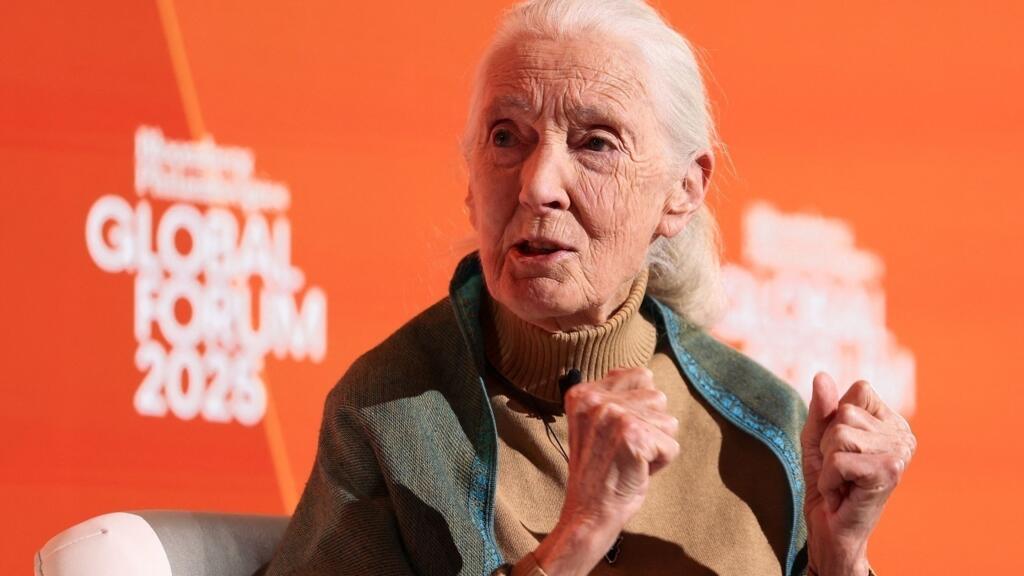
Jane Goodall, the British primatologist whose pioneering research transformed humanity’s understanding of chimpanzees and who went on to become one of the world’s most influential voices for nature, has died aged 91, her institute announced on Wednesday.
Goodall “passed away of natural causes” while in California during a speaking tour of the United States, the Jane Goodall Institute said in a statement on social media.
“Dr Goodall’s discoveries as an ethologist revolutionised science, and she was a tireless advocate for the protection and restoration of our natural world,” it added.
Scientific pioneer
Born on 3 April 1934 in London, Valerie Jane Morris-Goodall - later known simply as Jane Goodall - displayed a fascination with animals from a very young age. Her father gave her a toy chimpanzee, “Jubilee”, which she cherished throughout her life.
Enthralled by the Tarzan adventure books, she later remarked with amusement that Tarzan had married the “wrong Jane”.
Goodall’s unconventional path began in 1957 when, at the age of 23, she travelled to Kenya to visit a friend.
There she met Louis Leakey, the eminent Kenyan-based palaeontologist, who hired her as his secretary and soon recognised her extraordinary observational gifts.
Zoologist Jane Goodall warns: ‘The world is a mess’ ahead of COP16
Leakey dispatched her to what is now Gombe Stream National Park in Tanzania, where she embarked on a groundbreaking study of chimpanzees in their natural habitat.
With no formal scientific training at the time, Goodall’s approach was unconventional but revolutionary: she named the chimpanzees she observed, rather than assigning them numbers, and emphasised their individuality, emotions, and social bonds.
Her most celebrated discovery came in 1960, when she observed chimpanzees using sticks and blades of grass as tools to extract termites from their mounds.
This shattered the long-held belief that tool-making was a uniquely human trait, forcing a profound re-evaluation of the boundary between humans and other animals.
Encouraged by Leakey, Goodall went on to pursue a doctorate at the University of Cambridge, becoming only the eighth person in the institution’s history to be awarded a PhD without first obtaining an undergraduate degree. Her thesis, based on her Gombe research, was published in 1965.
Research and global advocacy
In 1977 she founded the Jane Goodall Institute, which has since become a global leader in primate research, conservation, and community-led environmental projects.
Fourteen years later she launched Roots & Shoots, a youth movement dedicated to environmental and humanitarian action that now spans more than 60 countries.
Goodall’s transition from scientist to activist began in the 1980s after attending a US conference on chimpanzees, where she was confronted with the grim reality of animals used in biomedical research and the accelerating destruction of African forests. Deeply shaken, she resolved to speak out.
Anthropologist, conservationist and eternal optimist Richard Leakey dies at 77
From then on she travelled tirelessly, sometimes visiting more than 300 cities in a single year, urging audiences to act with compassion towards both animals and the planet. She became a powerful voice in global debates on biodiversity, climate change, and sustainable development.
Even in her later years, Goodall remained a commanding presence. Ahead of a United Nations biodiversity summit in Colombia in 2024, she told AFP: “The time for words and false promises is past if we want to save the planet.”
Her philosophy was rooted in the belief that every person, no matter how ordinary, can make a difference. “Each individual has a role to play,” she said, “and every one of us makes some impact on the planet every single day. We can choose what sort of impact we make.”
Indigenous Kenyans forced off ancestral lands in name of conservation: NGOs
Enduring legacy
Goodall received countless accolades during her lifetime, including damehood in 2004, the French Legion of Honour, the Benjamin Franklin Medal, and the Templeton Prize. She authored numerous books — from academic works to children’s stories — and was the subject of acclaimed documentaries, including National Geographic’s Jane (2017).
Despite her fame, she remained humble, often describing herself as “just a girl who loved animals”. Her legacy lies not only in her scientific achievements but also in the millions she inspired to treat animals and the natural world with empathy and respect.
(with newswires)







